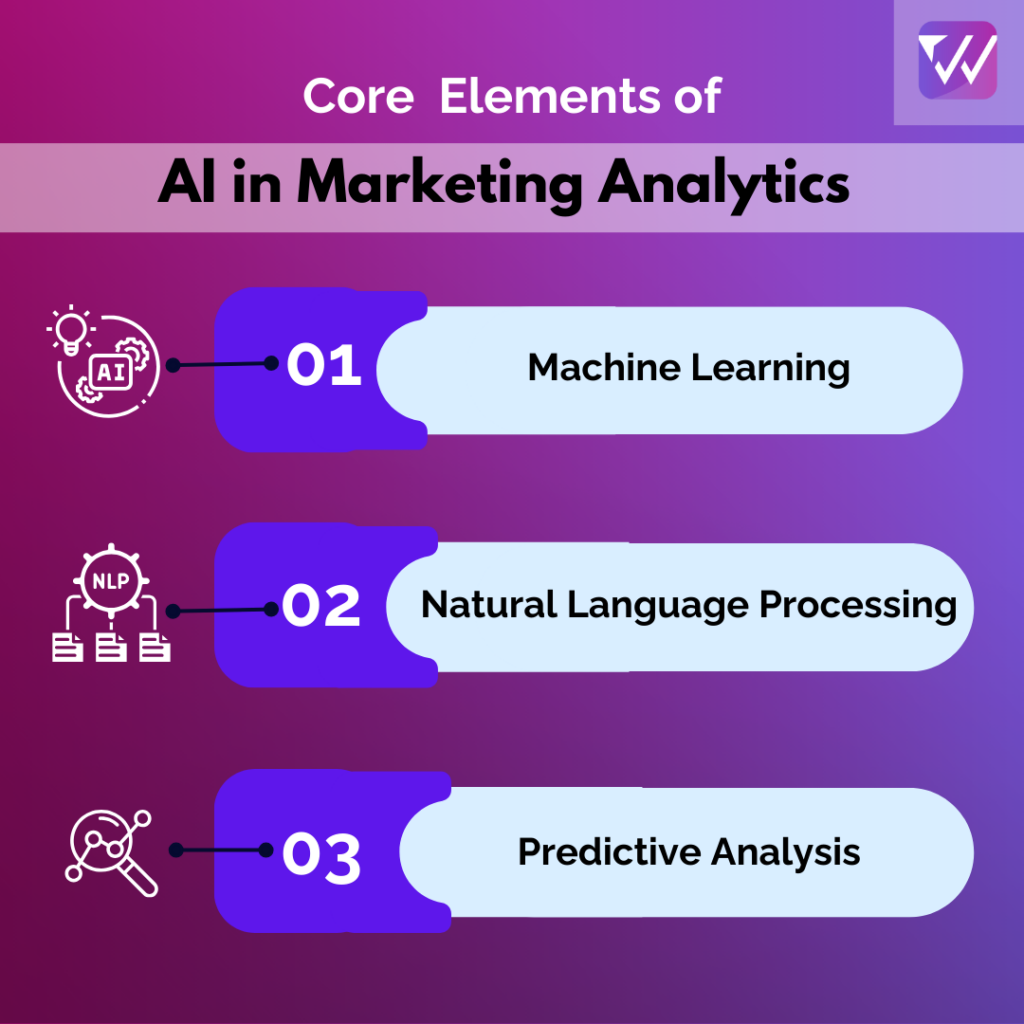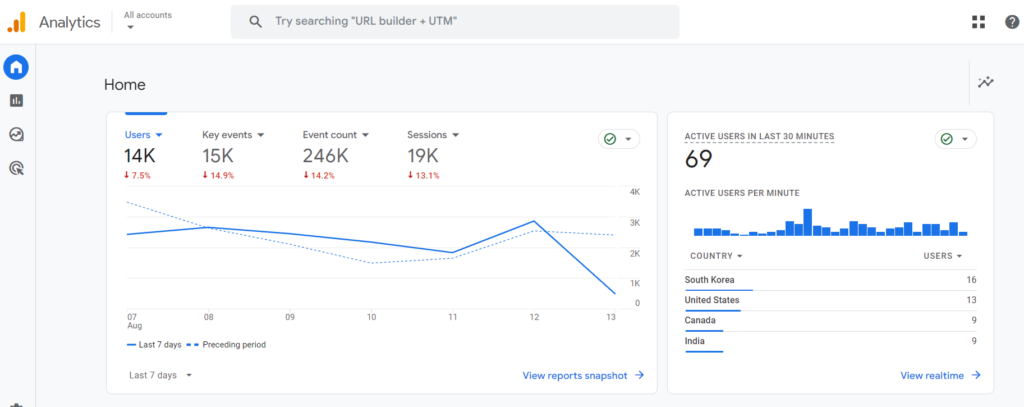Introduction
In today’s digital landscape, businesses produce enormous amounts of data daily. However, simply having raw data isn’t sufficient for gaining a competitive advantage. To effectively utilize this data, companies must convert it into actionable insights. This is where AI-powered analytics comes into play. By employing advanced AI analytics tools, businesses can quickly and accurately analyze data, uncovering valuable patterns and trends that inform strategic decision-making. This comprehensive guide will introduce you to the basics of AI in data analytics, covering everything from fundamental concepts to advanced applications, while also emphasising its influence on marketing.
Understanding the Role of AI in Modern Marketing
What is AI-powered analytics?
AI-powered analytics involves the application of artificial intelligence technologies, such as machine learning (ML) and natural language processing (NLP), to analyse large datasets and derive meaningful insights. Unlike traditional data analysis techniques, AI in data analytics can process vast amounts of data with remarkable speed and accuracy, revealing patterns and trends that might be challenging for humans to identify.
Core Elements of AI in Marketing Analytics

- Machine Learning (ML): ML algorithms learn from data and enhance their accuracy over time, making them well-suited for predictive analytics. For example, companies like Google utilize ML to improve search results based on user interactions.
- Natural Language Processing (NLP): NLP enables computers to comprehend and interpret human language, making data analysis more intuitive. This technology is frequently employed in chatbots and sentiment analysis tools.
- Predictive Analytics: This approach uses historical data to forecast future outcomes, allowing businesses to make proactive decisions. For instance, retailers like Amazon leverage predictive analytics to suggest products to users based on their browsing history.
The Advantages of AI-Powered Analytics in Marketing
- Faster Data Processing and Enhanced Accuracy
One of the key benefits of AI-driven analytics is its capability to swiftly and accurately process vast amounts of data. IBM states that companies utilizing AI analytics can analyze data 50% faster than those that depend on traditional techniques. This rapid processing enables marketers to adapt to market fluctuations in real time, allowing for timely strategy adjustments.
- Better Customer Segmentation and Targeting
AI in marketing analytics allows businesses to more effectively segment their customer base. By examining behavioural data, AI can pinpoint distinct customer segments and customize marketing strategies for each group. According to McKinsey, personalized marketing approaches can boost conversion rates by as much as 20%. For example, Spotify leverages AI to categorize its users based on their listening habits, offering tailored music recommendations.
- Tailored Marketing Strategies
With AI analytics, companies can provide highly personalized marketing messages. AI-driven tools assess customer preferences and behaviours to generate customized content that resonates with individual customers, fostering engagement and loyalty. A report from Salesforce indicates that 76% of consumers expect businesses to understand their needs and expectations, which can be achieved through personalized marketing.
- Instant Data Analysis and Insights
AI-powered predictive analytics delivers real-time insights, allowing marketers to respond quickly to shifting market conditions. This responsiveness is vital in today’s fast-paced business landscape, where timely decisions can significantly impact outcomes. For instance, fashion retailer Zara employs real-time data analysis to modify its inventory and marketing strategies in line with current fashion trends.
Essential Features of Analytics Tools Using AI
- Utilizing Automated Insights and Recommendations from AI-Powered Analytics
AI-driven analytics tools can automatically produce insights and recommendations, saving marketers significant time and effort. These insights can guide various elements of marketing strategy, from content creation to campaign optimization. For instance, HubSpot’s AI-powered analytics tool offers automated suggestions for enhancing marketing campaigns.
- Integrating Marketing Automation Platforms
AI data analytics tools can integrate with popular marketing automation platforms such as HubSpot and Marketo, ensuring seamless marketing operations. This integration ensures that insights are readily available and actionable, allowing marketers to automate and optimize their campaigns efficiently.
Leveraging Google Analytics for Overall Website Analysis
Google Analytics is a popular tool that incorporates AI-driven analytics into its platform. With features such as predictive metrics and automated insights, it assists businesses in making informed decisions, tracking user behaviour, and enhancing marketing strategies.

How to Incorporate AI Analytics into Your Marketing
- Assess Your Current Data and Analytics Capabilities
Evaluate your current data and analytics setup. Identify any gaps and areas that need improvement to facilitate a smooth transition. Conduct a detailed audit of your data sources, storage solutions, and processing capabilities to prepare for AI integration.
- Select the Right AI Analytics Tools
Choose the right AI tools for data analytics as it is an essential factor for achieving success. When selecting a tool, consider user-friendliness, scalability, and how well it integrates with your existing systems. Popular choices include Google Analytics, which offers distinct features that cater to various business needs.
- Integrating AI-Powered Analytics with Your Marketing Strategy
Establish clear objectives and key performance indicators (KPIs) to effectively incorporate AI analytics into your marketing strategy. Leverage AI-driven insights to guide your campaigns and assess their effectiveness. For instance, if you aim to boost customer engagement, utilize AI to analyse engagement metrics and refine your content strategy accordingly.
- Train and Upskill Your Team
Train your team on how to use these tools effectively to fully harness the advantages of AI in marketing analytics. Invest in upskilling initiatives to keep your team informed about the latest AI technologies. Online courses, workshops, and certification programs can equip your team with the skills they need.
Case Studies: Success in Action
- E-commerce: Enhancing Customer Experience
Major e-commerce platforms like Amazon utilize AI-driven analytics to tailor customer experiences. By examining purchase histories and browsing habits, Amazon suggests products that align with individual preferences, leading to a 29% boost in sales. Likewise, Alibaba employs AI to create personalized shopping experiences, fostering customer loyalty and encouraging repeat purchases.
- Retail: Optimizing Inventory Management
Retailers such as Walmart harness AI analytics to streamline inventory management. AI algorithms forecast demand for different products, allowing Walmart to keep optimal stock levels and minimize both overstocking and stockouts. This strategy has resulted in a 30% decrease in excess inventory and a 20% rise in sales.
- Finance: Improving Fraud Detection
Financial institutions are leveraging AI-driven analytics to uncover fraudulent activities. By scrutinizing transaction patterns, AI can spot irregularities and flag potential fraud in real time, cutting financial losses by as much as 30%. For instance, Mastercard analyzes millions of transactions each day using AI, achieving high accuracy in detecting fraudulent behaviour.
Future Trends in AI-Powered Analytics for Marketing
- Emerging Trends in AI and Analytics
The outlook for AI-powered analytics is promising, with several emerging trends poised to influence the industry. These trends include the growth of augmented analytics, a greater embrace of AI-driven decision-making, and ongoing advancements in AI technology.
Augmented analytics merges AI with traditional analytics to improve data analysis, making it more user-friendly for those without technical expertise.
- The Evolving Role of AI in Strategic Marketing
As AI technology progresses, its influence on strategic marketing will continue to grow. Companies will increasingly depend on AI analytics to inform their marketing strategies, from planning campaigns to executing them. AI will empower marketers to forecast market trends, optimize advertising budgets, and personalize customer interactions on a large scale.
- Predictions for the Future of AI in Marketing Analytics
The use of AI-driven analytics in predictive marketing is growing, enabling more efficient, data-driven strategies that foster business growth. AI’s role in developing new marketing channels and refining existing ones continues to expand, making it an indispensable tool in the industry
Conclusion
In summary, AI-driven analytics is transforming how businesses tackle marketing. By converting raw data into actionable insights, AI analytics enables marketers to make well-informed decisions and fine-tune their strategies. Whether you’re running a small business or managing a large corporation, using AI tools for data analytics can greatly boost your marketing initiatives. As you begin this journey, keep in mind to start small, select the right tools, and continually enhance your team’s skills to remain competitive.
Discover how Writomat harnesses AI-powered analytics to transform your data into actionable marketing insights. Get in touch with our experts today for a personalized demo!
👉 Try it free! Claim your offer here.
Frequently Asked Questions
- How does AI analytics optimize real-time data processing in marketing?
AI analytics impacts machine learning algorithms to process huge amounts of data in real-time giving quick insights to make decisions. This helps marketers to change their plans based on current customer actions.
- What role do AI-powered analytics play in predictive marketing campaigns?
AI-powered predictive analytics lets marketers guess future customer actions, to improve campaign timing, content, and channels. It enables predictive modeling helping brands to target audiences.
- How does AI for data analytics enhance advanced customer segmentation?
AI in data analytics makes complex customer grouping easier by looking at behaviour, demographics and likes on a big scale. It finds small groups to create very personal marketing plans.
4. How do businesses implement AI tools for data analytics to measure marketing ROI?
Companies apply AI tools for data analytics to monitor essential performance metrics across many channels. This helps them link ROI to specific campaigns, content, or customer interactions making their marketing spend more effective.
Leave a Reply